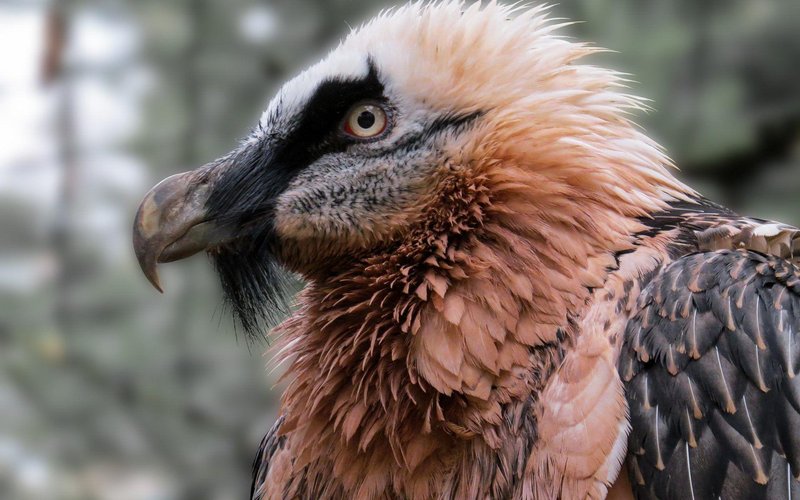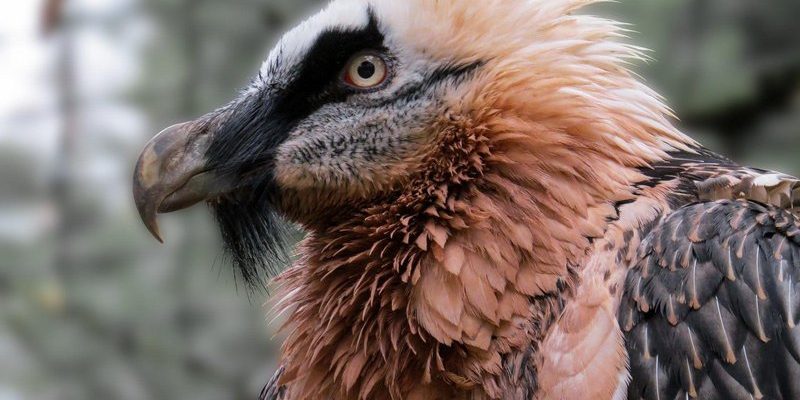
So, what makes the bearded vulture tick? Are they as intelligent as some mammals? In this article, we’ll dive into their cognitive skills and behaviors, exploring how these raptors navigate their world with a unique blend of instinct and intelligence. We’ll look at their hunting strategies, problem-solving skills, and social behaviors, helping you understand just how smart these birds really are.
Understanding Bearded Vultures
Bearded vultures, or *Gypaetus barbatus*, are remarkable birds of prey found mostly in mountainous regions across Europe, Africa, and Asia. They are best known for their striking appearance, with a wingspan that can reach up to 10 feet and a distinctive beard-like tuft of feathers under their beaks. But there’s more to these birds than just looks. Their intelligence shines through in their unique behaviors and survival strategies.
**Hunting and Diet**
Here’s the thing: bearded vultures have a rather interesting diet. Unlike many vultures that feast on carcasses, these birds have a penchant for bones. Yes, you read that right! They are the only raptors that specialize in eating bones. They’ve developed a fascinating technique to access the nutritious marrow inside. Typically, they fly high and drop bones from great heights onto rocks to break them open. This strategy not only shows their ability to use tools but also highlights their problem-solving skills.
**Social Structure**
Bearded vultures are also social creatures. They tend to establish lifelong pair bonds and share parental responsibilities. You might be wondering how this relates to their intelligence. Well, their social interactions require a level of understanding and cooperation that speaks to their cognitive abilities. They often communicate through visual displays and vocalizations, which adds another layer to their intelligence.
Navigating Their Environment
Bearded vultures are master navigators of the skies. Their exceptional eyesight allows them to spot potential food sources from great distances, but it’s their *cognitive mapping* abilities that really stand out. This means they can remember locations of food sources and safe nesting areas, even in complex mountain terrains.
**Spatial Awareness**
Imagine trying to find your way around a new city without a map. Bearded vultures, with their keen sense of spatial awareness, can remember the layout of their territory, which helps them navigate efficiently. This skill is integral to their survival—knowing where to find food and shelter can mean the difference between life and death.
**Adaptability**
Moreover, adaptability is another hallmark of their intelligence. Bearded vultures can thrive in harsh environments and adjust their behaviors based on changing conditions. For instance, if a reliable food source becomes scarce, they might change their hunting tactics or even their migration patterns. This flexibility showcases their ability to learn from experiences and adapt to new challenges, reinforcing their status as intelligent creatures.
Problem Solving in Action
When it comes to problem-solving, bearded vultures exhibit skills that are quite remarkable. Think of them as the MacGyvers of the bird world. They often face challenges that require creative solutions, especially when it comes to accessing food.
**Using Tools**
As mentioned earlier, these birds not only drop bones but also use other environmental elements to their advantage. For instance, they might utilize rocks or logs to help break bones into smaller, more manageable pieces. This clever use of tools demonstrates advanced cognition, as they understand how different objects can be manipulated to achieve a desired outcome.
**Learning from Experience**
Bearded vultures also learn from their mistakes, which is a key aspect of intelligence. If a particular method of hunting doesn’t yield results, they’ll remember that and try a different approach next time. This ability to learn from experiences shows a deeper understanding of their environment, which is a sign of advanced cognitive function.
The Joy of Parental Care
One of the most touching aspects of bearded vulture behavior is their approach to parenting. Their commitment to their chicks reveals a great deal about their social habits and intelligence.
**Cooperative Parenting**
Both parents are involved in caring for their young, which isn’t always the case in the animal kingdom. They take turns incubating eggs and feeding the chicks. This teamwork not only strengthens their bond but requires them to communicate and coordinate effectively.
**Teaching Skills**
Once the chicks hatch, the parents begin teaching them essential survival skills. This includes how to hunt, recognize food sources, and navigate their environment. The time and effort spent on teaching their young show a level of foresight and strategic thinking that adds to their overall intelligence. It’s like sending your kid to school, ensuring they’re well-prepared for the challenges ahead!
Communication: The Language of Bearded Vultures
Communication among bearded vultures is essential for maintaining social bonds and coordinating parenting duties. They use a mix of visual signals and vocalizations to express their needs and intentions.
**Vocalizations and Body Language**
Their vocal sounds range from high-pitched calls to deep croaks, which convey different messages. Body language also plays a significant role—a puffed-up posture might signify aggression or dominance, while a more relaxed stance could indicate calmness. Each of these signals helps them interact and maintain social harmony within their group.
**Visual Displays**
Additionally, during courtship and social interactions, they perform elaborate aerial displays. This not only strengthens pair bonds but also serves as a way to show off their strength and health to potential mates. These displays demonstrate their intelligence, as they need to be aware of their surroundings and the responses of other birds during these interactions.
Conservation and the Future of Bearded Vultures
Understanding the intelligence of bearded vultures gives us a deeper appreciation for these remarkable creatures. But their future is uncertain. Habitat loss, poisoning, and hunting have significantly impacted their populations.
**Conservation Efforts**
Various organizations are working to protect these magnificent birds and their habitats. Conservation efforts focus on creating safe environments for breeding, monitoring populations, and educating local communities about the importance of these birds. By raising awareness of their intelligence and role in ecosystems, we can foster a greater sense of stewardship.
**Why It Matters**
Here’s the thing: conserving bearded vultures isn’t just about saving one species; it’s about preserving biodiversity and the balance of our ecosystems. These intelligent birds play a crucial role in their environments by helping to clean up carrion and control populations of other species.
In summary, bearded vultures display a remarkable array of cognitive abilities and behaviors that speak to their intelligence. From their innovative hunting techniques to their social structures and parenting strategies, they offer a window into the complex world of avian intelligence. As we work to protect them, we’re not just saving a species; we’re ultimately safeguarding the wonders of nature that inspire us all.

